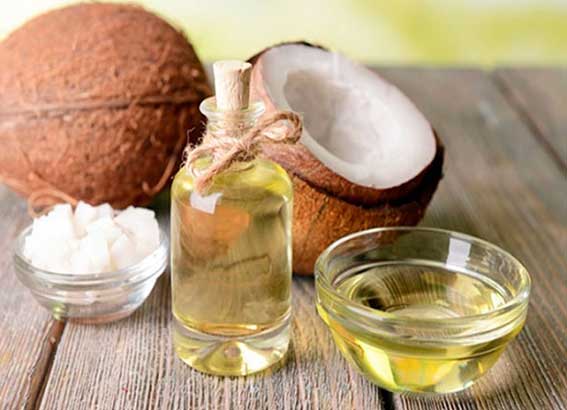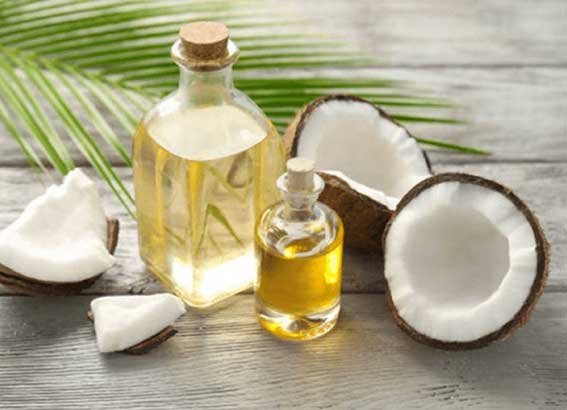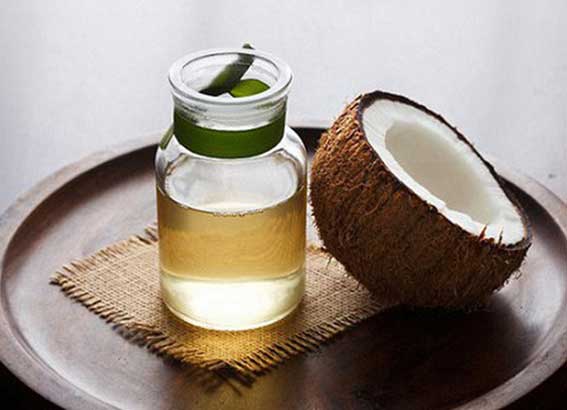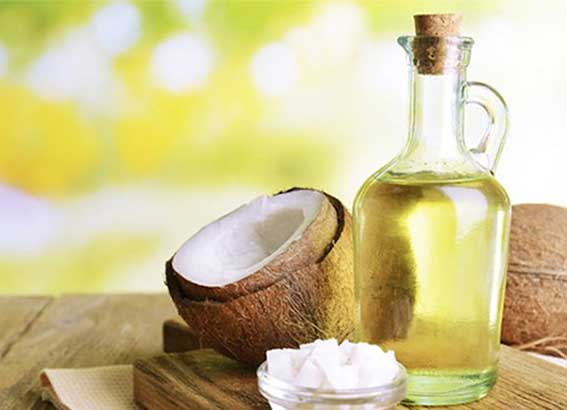- 09/08/2022 11:05:18
- Life
- Skin care secrets
5 uses of coconut oil and notes when using it
1. What is coconut oil? How to identify virgin coconut oil
Coconut oil is the oil obtained from the old coconut, there are 2 types of oil: pure cooking coconut oil and cold pressed coconut oil. The cold pressing method does not use heat and chemical treatment. Cold pressed oil as clear as water. Coconut oil is often yellow, light yellow or clear like water.
Coconut oil is a liquid, that is true but it very easily becomes a solid state. Coconut oil is in the liquid state when the temperature is above 25 degrees Celsius and the solid state at below 25 degrees Celsius, but we can make it liquid as simple as heating it up.
How to identify virgin coconut oil from coconut oil with impurities:
To know if virgin coconut oil is pure or not, you just need to put the bottle of virgin coconut oil in the refrigerator. Wait 30 minutes to 1 hour (depending on the size of the coconut oil small or large), in the temperature below 25 degrees Celsius, the virgin coconut oil will start to solidify completely.
On the contrary, if your bottle of coconut oil is not solidified, or partially solidified, the rest no matter how long it is in the refrigerator, it still does not freeze, then you have a basis to doubt the purity of the coconut oil you are using. are owned.
Alternatively, if you see that the coconut oil is white, you should double-check to see if there is a bleach, because the pure coconut oil cooked will not have such a pure white color.
How to distinguish using smell: the smell of virgin coconut oil is light and smells like coconut candy. If there is a different scent then it is definitely a blend of flavors and there will definitely be added preservatives, if so it is not good for your health, can cause cancer.
2. 5 uses of coconut oil for health and beauty
2.1. Health benefits
Virgin coconut oil contains important minerals and a number of fat-soluble vitamins such as calcium, magnesium, beta-carotene, vitamin A, vitamin D, Vitamin C, Vitamin E,... that the body can absorb and use. use immediately. The trace elements in coconut oil have beneficial effects on everyone's health.
See more: DHC Vitamin C Supplements
Use for fat-free people: Coconut oil provides less energy than other oils at 8.6 kcal per gram. While other oils provide energy for 9 kcal per gram.
Saturated fatty acids do not cause weight gain and obesity, very good for those who are on a weight loss diet. Coconut oil helps increase metabolism for up to 24 hours when food is absorbed or calories are burned. Not just excess calories To be stored as fat
Good for the digestive system: Coconut oil is a saturated fat, moderate sugar. This feature improves the performance of the large intestine.
Since it stimulates digestion, people who eat coconut oil in the early stages may experience diarrhea. That is normal, however if you eat a little and still have diarrhea, you should stop eating because coconut oil may not match the trace elements in the body.
Helps in bone care: The nutrients in coconut oil are rich in essential minerals including calcium and magnesium for strong bones. Coconut oil helps to supplement essential minerals to help bones recover easily after injury

Good for pregnancy: Coconut oil is considered good for both mother and baby in the womb. Especially if you eat coconut oil during pregnancy. It helps babies have good immunity. This greatly increases the value of breast milk.
Virgin coconut oil is also rich in calcium and magnesium to help strengthen calcium for bones and teeth as well as prevent osteoporosis or calcium loss for the mother during pregnancy.
Helps relieve stress: Coconut oil is rich in carbonic acid pH of acids and Capri Malik secreting acids. This substance helps to relax and help you sleep better.
It also helps relieve chronic fatigue, relieves stress and tension very well.
2.2. Beauty uses
Antibacterial causes acne: In coconut oil contains medium-chain fatty acids such as lauric acid, capric acid, .. has antibacterial effect causing acne. Apply coconut oil directly to the acne-affected skin, leave it on for about 15 to 20 minutes, then wash it off with a cleanser.
Moisturizing: Using coconut oil is a great way to moisturize the skin, especially with dry or damaged skin. Plus, coconut oil is also a key ingredient in many moisturizers, providing some sun protection like SPF4.
Facial Scrub: Mix coconut oil with baking soda, sugar or cinnamon, and oatmeal. Then apply the mixture on your face and massage gently.
Hair care: Coconut oil will strengthen your hair and take care of damaged hair. Massage coconut oil onto the scalp, after 10 minutes wash with clean water. Coconut oil also helps treat dandruff effectively, massage the scalp with coconut oil to reduce symptoms of dandruff such as itching, or flaking of the scalp.
Massage: Coconut oil helps you soothe fatigue and relieve muscle pain. When using, you should add a few drops of essential oils to increase the effect.
Get in shape: Coconut oil increases your metabolism, improves thyroid function and supports weight loss safely.
2.3. Medicinal uses
Effective cancer prevention: Coconut oil is a saturated fatty acid up to 92% to help strengthen the body's immune system. It also contains vitamin bio that qualifies as an antioxidant. Thus reducing the risk of cancer such as colon cancer, breast cancer and skin cancer.
Reduce the risk of incurable diseases: Pure coconut oil feature reduces bad cholesterol (LDL) and increases good cholesterol (HDL), thus reducing the risk of degenerative diseases such as diabetes, high blood pressure, obesity obesity, heart disease, liver and kidney disease.
Treats Toenail Fungus: The powerful antifungal properties of coconut oil will help you prevent fungal diseases. Add a few drops of oregano herb or tea tree oil to boost its antifungal abilities.
Relieve Sore Throat: Swallowing 1 tablespoon of coconut oil will help reduce pain and swelling in the throat, preventing infection.
Psoriasis treatment: Rub coconut oil on the damaged skin to kill the fungus. Add tea tree oil to reduce infection more effectively.
Ear pain: Ear pain, ear infection or ear infection can be cured very quickly with just a few drops of coconut oil mixed with garlic oil.
Relieves itchiness from chickenpox: Coconut oil relieves itching in chickenpox as well as mosquito or insect bites.
Cure Eczema: Coconut oil relieves itching, flaking, or dry skin caused by eczema, psoriasis or dermatitis.
Sunburn: Applying coconut oil on your body will help you prevent sunburn or reduce the burning sensation when your skin is sunburned.
Hemorrhoids: Coconut oil will reduce pain and discomfort that hemorrhoids cause.
Cure Nosebleeds: If you have frequent nosebleeds, rub some coconut oil into your nostrils.
Cure mouth sores: Apply coconut oil to mouth sores to relieve pain and prevent infection.
2.4. Uses in weight loss
Thanks to its medium-chain fatty acids, coconut oil can actively aid in weight loss. Studies show that coconut oil helps to reduce belly fat in women. It also helps in easy digestion and makes the thyroid and other endocrine glands work properly.

Before lunch or when hungry, you eat 1 spoon (maximum 2 spoons a day) will support weight loss very effectively, the natural fat in coconut oil will make you full quickly, limiting appetite. However, if you abuse a lot, it will be "counterproductive" and easier to fat, because the calorie and fat content in coconut oil is higher than in lard. One tablespoon of coconut oil contains up to 13.6 grams of fat and 117 kcal.
2.5. Uses in cooking
Use coconut oil in smoothies, yogurts, and soups. Besides using coconut oil for stir-frying, we can use this oil to enhance the taste of smoothies, coffee, tea, yogurt, or stews.
Make sure you melt the coconut oil before adding it to your smoothies, yogurts, stir well and feel the delicious, aromatic, greasy taste of coconut oil. You can also add coconut oil to your favorite soups and drinks.
3. Is it good to use coconut oil a lot? How much is enough?
Coconut oil has a higher percentage of saturated fat than animal fats. Therefore, if you eat too much coconut oil can lead to atherosclerosis.
Therefore, the World Health Organization (WHO), the US Food and Drug Administration (FDA) and many other countries (UK, Canada ...) all recommend not to use a lot of coconut oil in the diet. eat everyday.
Moreover, for people with problems with metabolic disorders (diabetes, hypertension, atherosclerosis, overweight and obesity, etc.), the use of products high in saturated fatty acids such as coconut oil It also increases the risk of dyslipidemia.
For people with sensitive skin, the improper use of coconut oil and especially of unknown origin can cause skin irritation, acne, itching, hives...










